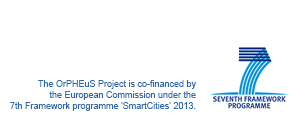Definitions
These definitions are project-specific definitions having been established during the technical discussions in the technical coordination calls or as specifically discussed in project meetings.
| Cooperative Coexistence | Optimal interactions between various energy networks (thermal, gas and power grid). |
|
| Supporting points (SP) | Supporting points (SP) mean within this project systems, strategies and measures that do not actually physically connect different energy grids, but support indirectly the coupling of multiple energy domains (e.g. Demand Side Management, Storage Management, etc.). |
|
| Control Setup / Strategies | A Control Setup is a system view assembled with all physically considered elements (for instance: solar panels, batteries, heat pumps) which are considered in a control space for various use cases. The elements can be controllable and non-controllable. |
|
| Control Target | A Control Target is a core goal realizable for a Control Setup – for instance holistic operation of power-heat network towards profit maximization. This goal can be studied in different Use Cases which look on a certain aspect - for instance: reduce costs considering CO2 penalties for heating supplier. |
|
| Coupling Point | Physical element which connects two different energy domains (for instance: combined-heat-and-power plant, electric boiler) |
|
| Use Case | A given goal focussing on a certain stakeholder/ market participant under a certain control target - for instance: reduce costs through CO2 penalties minimizing fossil fuel usage for heating supplier. |
|
| Historical observation | Measured data for a certain past period |
|
| Near real time observation | Measured data for the current point in time |
|
| Historical forecast | Forecast at a certain time in the past |
|
| (Near real time) forecast | Forecast in the current point in time |
|
| Nowcasting | Forecast with a very short time horizon of a few hours |
|
| Machine to Machine (M2M) | M2M systems are systems in which various devices, sensors, and computing systems communicate with the physical environment and with each other without human intervention, in order to offer easy, homogenous, and efficient remote access to machine or connected data sources. |
|
| Customer | Energy end-user (private citizen or public institution) |
|
| Prosumer | Customer enabled to produce energy locally at/near his/her consumption location. |


